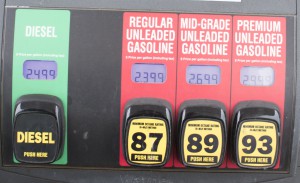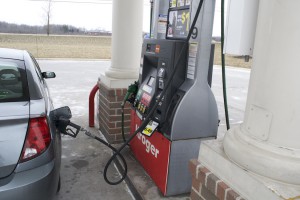Even though another hurricane swept across the Gulf of Mexico this past weekend, the average price that consumers pay for gasoline dropped again this week, according to AAA.
AAA reported that motorists are paying on average six cents less for a gallon of gasoline on the week with all states seeing prices at the pump either drop or hold steady.
The national average is $2.49 per gallon, which is 18 cents cheaper than a month ago just after Hurricane Harvey had slammed in the Texas coast near Houston. The latest Energy Information Administration report shows gasoline demand at 9.2 million barrels daily, down 281,000 barrels per day from the week prior. This rate suggests that retail gas prices are showing steady promise of returning to pre-hurricane rates, AAA said.
“Gas prices have fallen steadily for the past four weeks and now we are seeing gasoline demand drop alongside prices,” said Jeanette Casselano, AAA spokesperson.
(Gas prices, fuel inventories continue dropping. For the story, Click Here.)
“The latest demand figures show the lowest since the week Hurricane Harvey hit and can likely be the beginning of a downward demand trend indicating even cheaper gas prices to come this fall,” she said.
Over the weekend, Hurricane Nate made landfall near Biloxi, Mississippi, and before the storm, many Gulf Coast oil platforms and rigs were shut down and employees evacuated. In addition, two refineries, accounting for 6% of total Gulf Coast refining capacity, shut down but the refineries came through the storm undamaged and were expected to resume operations.
Overall, motorists will see minimal to no impact to gas prices in the region hit by the storm, AAA said.
In the top 10 markets with the largest weekly drop, Georgia and Michigan were tops with prices dropping 10 cents per gallon. Prices also dropped by 9 cents per gallon in South Carolina, Indiana and Ohio and by 8 cents per gallon in Alabama, Tennessee, North Carolina, Mississippi and Florida.
Last week’s EIA report showed that U.S. crude oil stocks fell by 6 million barrels since the end of September with almost 2 million barrels in exports and refinery utilization down half a percentage point to 88.1% of total capacity.
(Click Here for details about the national average fuel economy dropping.)
The drop in demand combined with ample supply has kept downward pressure on crude oil prices. Observers are keeping an eye on crude oil exports from the U.S., where production has slowed during the hurricane seas, and whether the Organization of Petroleum Exporting Countries will extend its reduced production agreement beyond March 2018 to drive crude oil prices higher.
Meanwhile, the average fuel economy or window-sticker value of new vehicles sold in the U.S. in September was 25.3 miles per gallon — unchanged from August, according the monthly survey by the University of Michigan Transportation Research Institute.
The value for September is up 5.2 mpg since October 2007 (the first month of our monitoring but still down 0.2 mpg from the peak of 25.5 mpg reached in August 2014. The average fuel economy for model year 2017 vehicles (sold October 2016 through September 2017) was 25.2 mpg, up slightly from 25.1 mpg for each of the preceding three model years.
The University of Michigan Eco-Driving Index – an index that estimates the average monthly emissions of greenhouse gases generated by an individual U.S. driver – improved to 0.81 in July 2017, down from 0.83 in June 2017 (the lower the value the better).
(To see more about the White House releasing some of the strategic reserves, Click Here.)
The EDI indicates that the average new-vehicle driver produced 19% lower emissions in July 2017 than in October 2007, but 3% higher emissions than the record low reached in November 2013, UMTRI reported.


